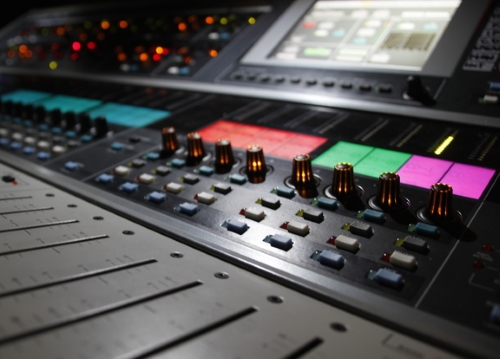
In fact, one of the best words of wisdom I’ve heard for learning how to drive a digital console is “Don’t try to think digital; instead just think analog.” The reason that works is because digital audio consoles were designed to mimic the functions of the analog consoles that they grew out of.
Another significant advantage of the digital consoles is that many of them include extraordinarily helpful “outboard” devices on every channel.
Here’s Just One Scenario.
With an analog console, we might go out and purchase several compressors. Compressors are used to smooth out the dynamic range of various inputs, like the worship leader, bass guitar, or the senior pastor. Patching compressors to each of the praise team vocal inputs can really help tighten up their blend.
Like any other pieces of audio gear, there are good ones ($$$) and not so good ones ($). Once you start using compressors, you’ll find they really come in handy, and having just one probably won’t make you happy. You might want several. Two? Four? Eight? Even sixteen!?! Before you’re done, you could have spent hundreds, if not thousands, of dollars just on compressors.
I’m not saying that every audio input should always have a compressor in use. Used incorrectly, a compressor can seriously degrade the sound quality of an input. But the mere fact that your digital console has a compressor available on every single input channel should give every church sound operator goosebumps.
Now extend that same benefit to having audio gates and/or expanders available for use on every single input channel as well. And then there are the built-in effects like reverb, echo and chorusing, all right there inside that seemingly innocent looking console.
Smaller Footprint
Many digital consoles have a smaller footprint than their comparably equipped analog counterparts. If you were to have a similarly equipped analog console, you could easily fill two equipment racks with outboard gear sitting next to the console with effects processors, compressors, gates and so on.
Give any building committee a choice between (1) investing in a digital console so the production booth can be smaller, or (2) saving money by purchasing the analog console but giving up seats to the larger production booth footprint, and I think you’ll find in the long run that they would much rather save room for the extra seats.
Safe On The Downbeat
Another advantage of the digital console is that a seasoned sound operator can go through a series of soundchecks and rehearsals with your worship team, using their experience to arrive at channel EQ settings and other console adjustments that refine the sound of the worship team, and then save those settings as a computer file.
From that point on, those settings can be used as a starting point to work from. You can even save a copy of that console computer file on the church server, or on someone’s office computer so you know it’s safe. (See Using Scenes on a Digital Audio Console.)
Yes, over time settings are going to be changed. Your tech team can improve and further refine those settings over time. But if there’s ever any question about how things are sounding, you can easily recall those original settings and compare the sound character. You might consider that digital epoxy.
Don’t get me wrong. Despite all the benefits and built-in features of digital consoles, analog consoles aren’t going away anytime soon. They are going to be around for several more years. And you still get what you pay for. You can’t compare a $2,500 analog console and a $20,000 digital console. Nor can you compare a $50,000 analog console with a $5,000 digital console. In general, the more expensive console is very likely going to sound better.
My comments here have just barely grazed the surface on this topic, but hopefully I’ve given you something to think about.
I’ll leave you with this.
Don’t Be Afraid Of The Technology.
Most people find digital consoles very easy to operate. If your team is comfortable driving an analog console, chances are they will be fine driving a digital console. At the same time, don’t think you’re somehow missing out on sound quality by choosing an analog console. A quality analog console can sound just as good as a similar quality digital console. What you’re giving up are the features described above.
This article provided by ChurchSoundCheck.com. Read the original article here.
